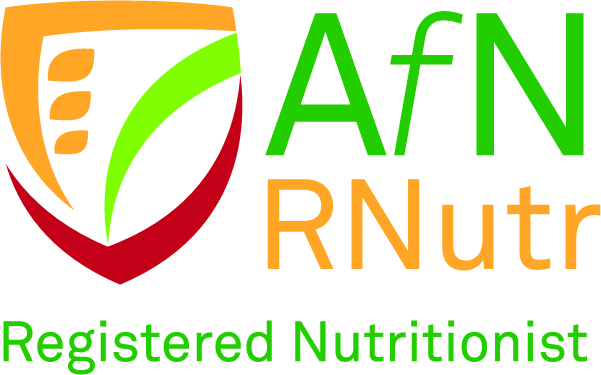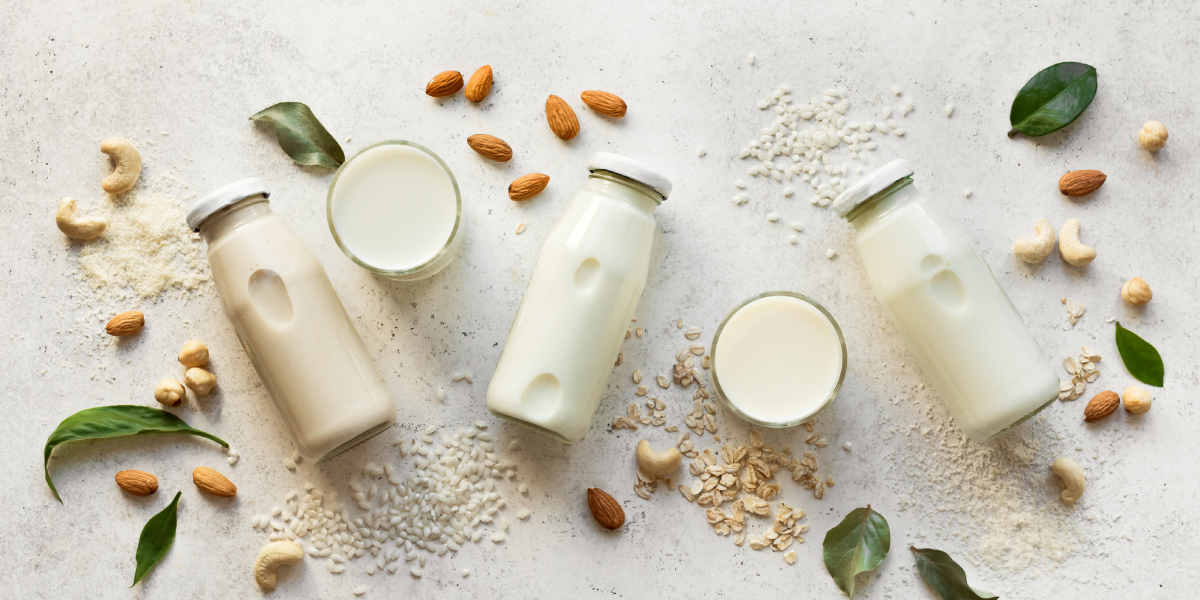Plant-Based Milk Alternatives
Plant-based milk alternatives have grown in popularity over recent years as many people choose to avoid or reduce dairy consumption as a result of the overall trend in plant-based diets; for animal welfare or allergy/intolerance reasons and through increased availability.
They are often made from nuts such as almonds, cashews, and hazelnuts; legumes such as pea and soya; and cereals such as oat and rice. Some are also made from hemp seeds, coconuts and even potatoes!
Legally, these drinks cannot be named “milk” (along with other dairy products such as “butter”, “cheese”, “cream” and “yoghurt”) as these terms are protected under UK legislation for use on animal products only, hence the phrase “milk alternative”,”m’lk”, “mylk”, “drink” or similar being used across these products.
In this blog we focus on the nutritional elements of choosing a plant-based drink, but please note that there are many other factors to consider when selecting an alternative to use or making a complete switch from dairy.
Let’s start with the nutritional composition of dairy milk.
Dairy Milk (cows)
Dairy milk is most commonly known for providing calcium; however, it also provides a good portion of daily vitamin B12 and iodine to the diet, which can be difficult to meet if living on a diet free of animal products. Therefore, if looking for dairy-free alternatives, it’s important to ensure that they are fortified with these 3 micronutrients as a minimum, especially if you’re using them as a complete replacement.
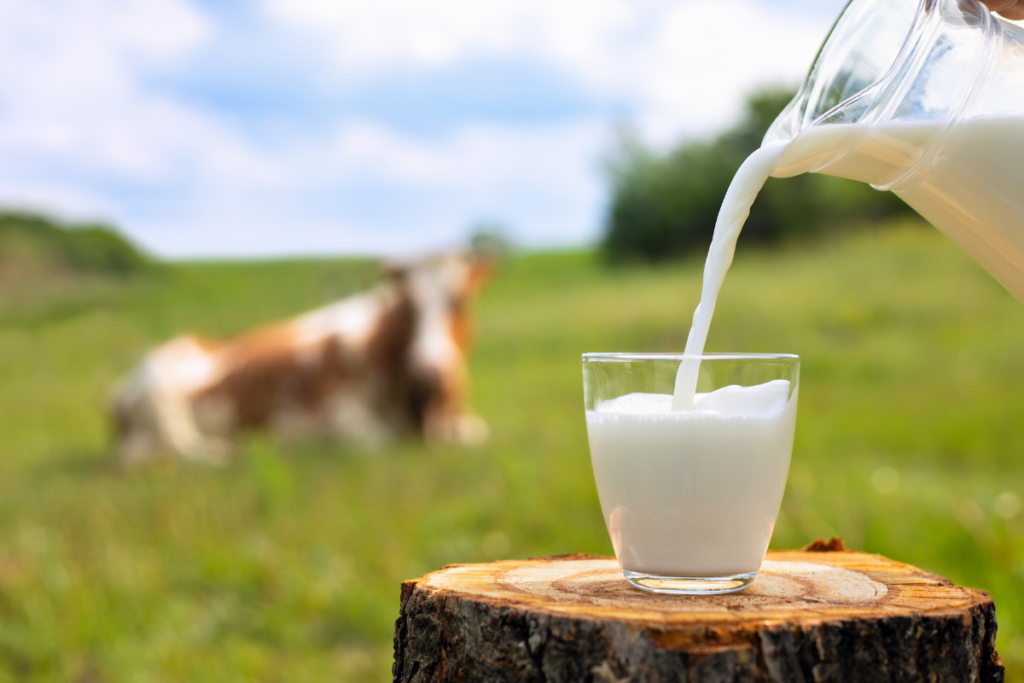
Why are these important within the diet?
Calcium
We know that calcium helps to build strong bones and teeth, but it also plays an important role in muscle contraction and blood clotting. Adequate intakes of calcium are especially important during childhood and adolescence, and for expectant mothers during pregnancy and whilst breastfeeding. The presence of vitamin D in many of the fortified plant-based milk alternatives will aid its absorption.
Iodine
Iodine, a less known mineral, but extremely important in the production of thyroid hormones (thyroxine and triiodothyronine). Although there are recommendations for all ages, it is essential that pregnant women (especially in the first trimester) and young children are consuming enough iodine as it plays a vital role in their cognitive development. Research shows that there are low intakes amongst children aged 11-18 and because over a 3rd of iodine intake is through milk, it’s highly important that the alternative you are using is fortified with this mineral.
Vitamin B12
We obtain B12 through the consumption of animal products, which is why plant milk fortification is necessary. B12 helps the body keep the nervous system healthy, makes red blood cells, metabolises folate and helps the body use energy. If you’re following a vegan diet or consume very little animal products its worth considering B12 supplements.

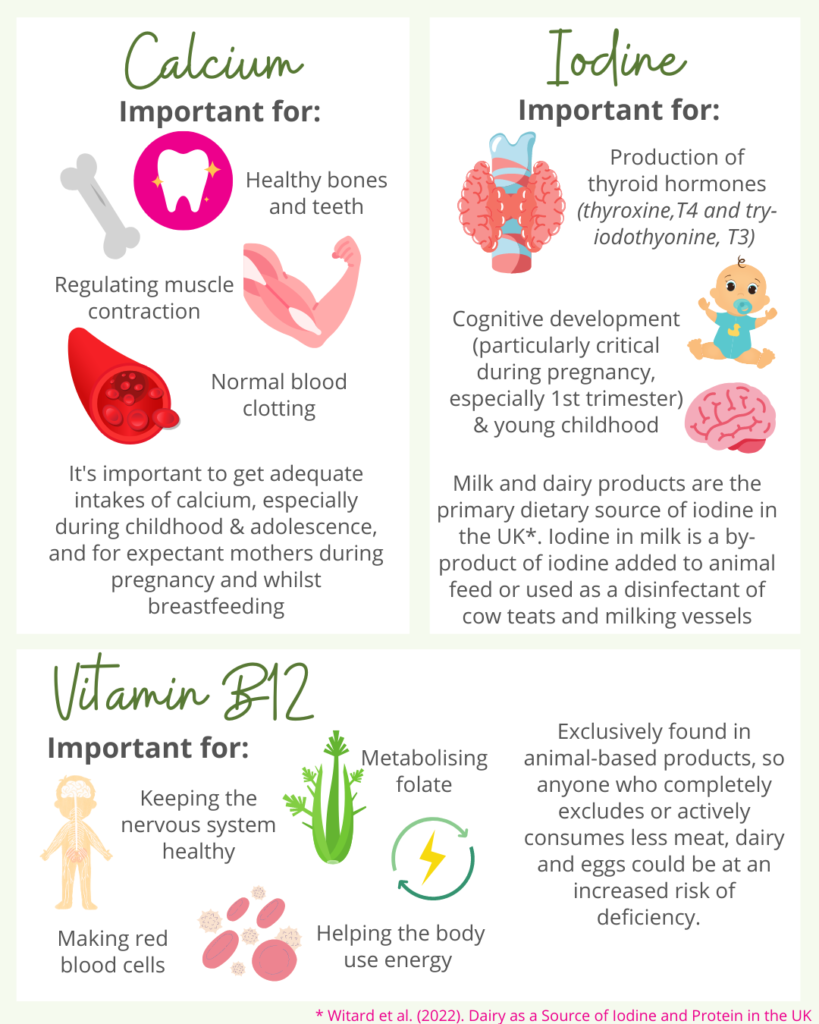
And there’s more to consider…
As well as calcium, B12 and iodine, other micronutrients present in dairy milk are phosphorus, potassium and riboflavin (vitamin B2). Milk is also a source of complete protein, contributes to fat intake and is hydrating, all of which are important, especially for young children. Milk can also be a great way of recovering post-workout.
What’s the difference in plant “milks”?
Plant-based milk sources derive from nuts such as almonds, cashews and hazelnuts; legumes like pea and soy and cereals such as oat and rice as well as hemp seeds and coconuts. Although these are all nutritious foods in their own right, after processing, many of their benefits are lost. From the drinks included in this blog, only around 6%, on average, of the plant-based item was left within the finished product. This is another reason added vitamins and minerals are of benefit in plant-based drinks.
There is a vast variability in the nutritional composition of plant-based milks depending on the ingredient base, and whether they are fortified. Unfortunately, there is currently a lack of standardization with micronutrient fortification and ‘Organic Food Regulations’ prohibit the fortification of organic variants.
Soya drinks are most comparable to dairy with regards to protein quantity and quality; other ingredient bases provide very little protein. However, as dairy milk should not be relied on as a key protein source for healthy adult population groups, there is little physiological relevance of the presence or absence of protein in plant-based drinks (this may not be the case for children under the age of 2 years).
Many, but not all, non-organic plant-based drinks are fortified with calcium and vitamins B12 and D. Some brands also fortify with vitamin B2, and a handful are beginning to fortify with iodine.
Vitamin D is often highlighted as a key dairy nutrient, however, unlike countries such as Canada where milk is mandatorily fortified with vitamin D, UK dairy does not provide any vitamin D, except for some products which may be fortified. The frequent fortification of plant-based drinks with vitamin D is there to further enhance calcium absorption.
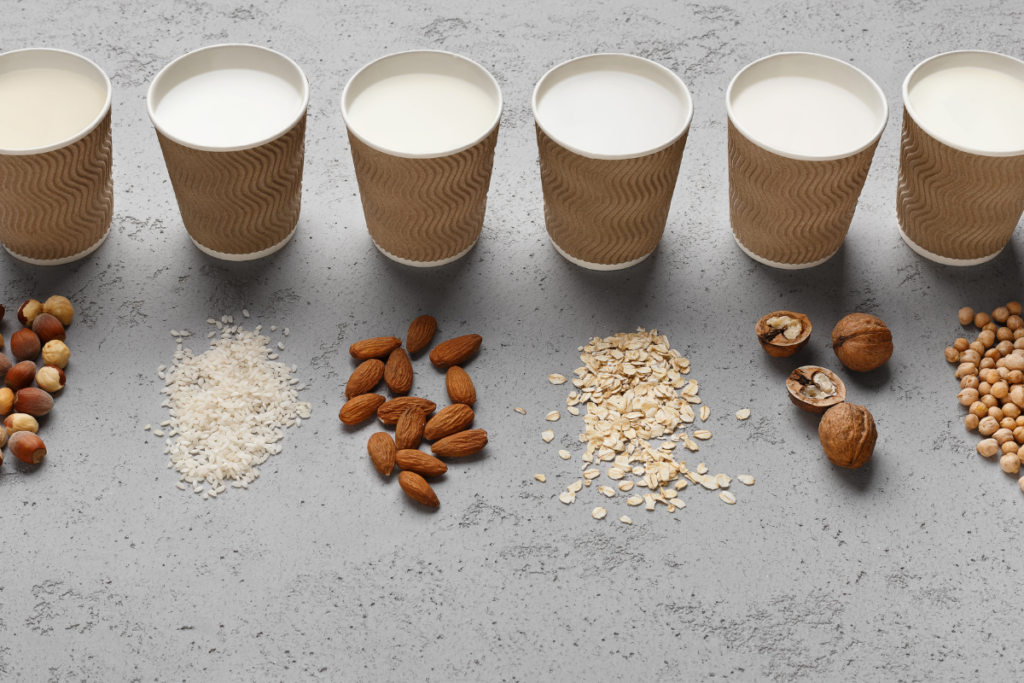
Every fortified plant-based milk alternative we looked at was fortified with calcium and the majority of the time, vitamin B12. In the UK, dairy milk is not generally fortified with vitamin D, however, for those plant-based milk alternatives that are, vitamin D was included in most of the ones we looked at. Recently, more and more brands are fortifying their products with iodine and it’s fantastic to see that from those surveyed here at The Nutrition Consultant; all M&S, Tesco, ASDA, Oatly, Mighty Pea and some Alpro products included iodine in their drinks. Many alternatives we found also included riboflavin, and in a few others, vitamin E. Some of the Growing Up Drinks by Alpro also included a range of other micronutrients such as vitamin A, vitamin C, vitamin B9, zinc and iron.
Hopefully, in future, other brands will follow suit with the fortification of their plant-based milk alternatives, with calcium, vitamin B12 and iodine as a minimum. Head over to our guide on micronutrients where you will find all you need to know on the vitamins and minerals out there.
If you generally purchase organic products, when it comes to plant-based milk alternatives, it is best to avoid the organic label as organic food regulations prohibit these from being fortified. This leaves these organic (and regular unfortified) versions to be essentially water, a small amount of the plant-based source, along with a stabiliser, oil and possibly some salt or sugar. Whilst this is perfectly fine if you’re enjoying a refreshing drink, it isn’t recommended as a large replacement to dairy.
Whether you’re looking for a complete alternative to milk or just looking to reduce your dairy consumption it’s worth knowing the difference between types and brands, as nutritionally speaking some will vary considerably. Take a look at the tables and infographics below for easy comparison and how they fair up against dairy milk and the recommended daily nutrient intakes.
Note: Where you see the abbreviation “mg”, this refers to milligrams, the symbol “µg” refers to micrograms which is 1000x smaller than a milligram.
The following infographics shows a selection of plant-based milk alternatives available currently in the marketplace, along with the accompanying nutritional composition. Fat, saturated fat and sugar have been colour-coded using the traffic light labelling criteria. The pink font shows where micronutrients have been added into the recipe.



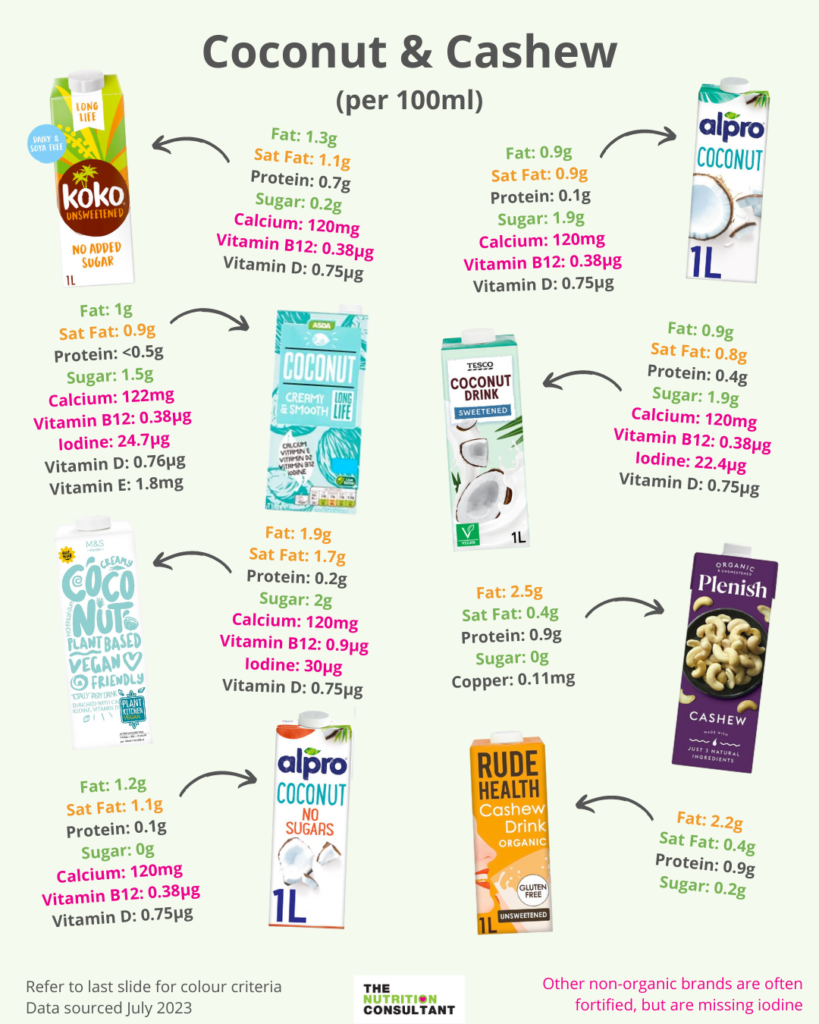
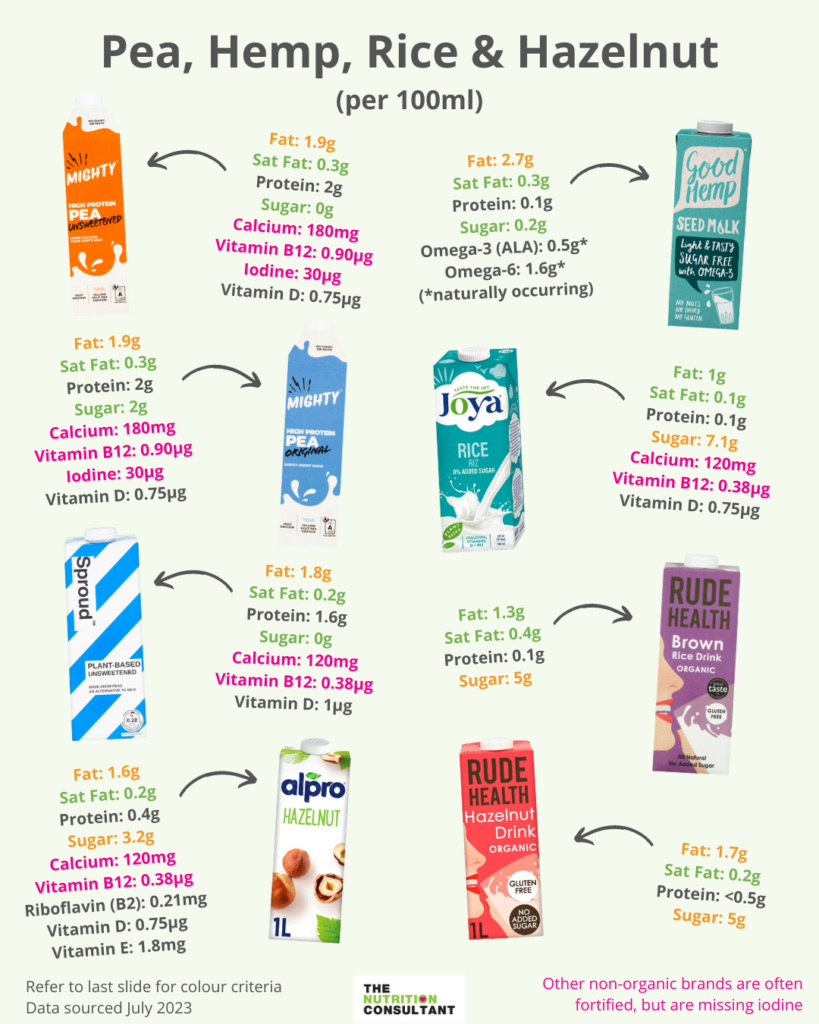
As you can see there are many options when it comes to choosing a plant-based drink. Most are low in saturated fat (except for the coconut versions and the Tesco Oat and Almond milk), but the majority of these contain little protein. If you’re looking for one with similar values to cow’s milk, soy and pea drinks are a recommended go-to, as these have a similar quantity of protein and are classed as ‘complete’ proteins.
However, just be aware that other plant-based proteins are not complete proteins (like rice, oat, cashew, almond, coconut, hemp and hazelnut). Therefore, these will need to be consumed in amounts greater than ‘complete’ proteins to have the same effects on muscle maintenance and growth due to the difference in amino acid profiles. Though, as dairy milk should not be relied on as a key protein source for healthy adult population groups, it shouldn’t be too much of a concern if your favourite plant-based milk alternative is lower in protein, as long as you are eating a varied and balanced diet (this may not be the case for children under the age of 2 years).
When it comes to the sugar content of plant-based milk alternatives, rice and oat drinks tend to be higher in free sugars (even if no sugar has been added). This is due to the nature of the production process, which involves breaking down the starches in the rice and oats into free sugars. As we should be limiting our free sugar intake to 30g per day, unsweetened variants should always be considered and especially for children (particularly important for children under 2 years who tend to consume a greater volume of milk than older children or adults).
Note: the sugars present in dairy milk (lactose) are not classed as free sugars and therefore do not count towards the 30g/day recommended intake.
In our analysis, we mainly looked at the long-life versions of the plant-based milk alternatives, so if you’re wondering what the difference is nutritionally between the fresh and long-life versions – there generally isn’t any. They are a very similar product, just packaged and stored differently!

Ingredients
Like dairy milk, water is the main ingredient in plant-based drinks with the plant solid making up anything from 2-10% of the end product. Various plants are used as a base, legumes such as soya and pea, cereals such as oat and rice, nuts such as coconut, cashew and hazelnut.
Commonly used processing ingredients are added for a number of reasons. For example, stabilisers are often used to help thicken the liquid and help with texture; Emulsifiers help with shelf life and product consistency (especially keeping water and oil from nuts blended together); and flavourings are often added to intensify the flavour of the raw material.
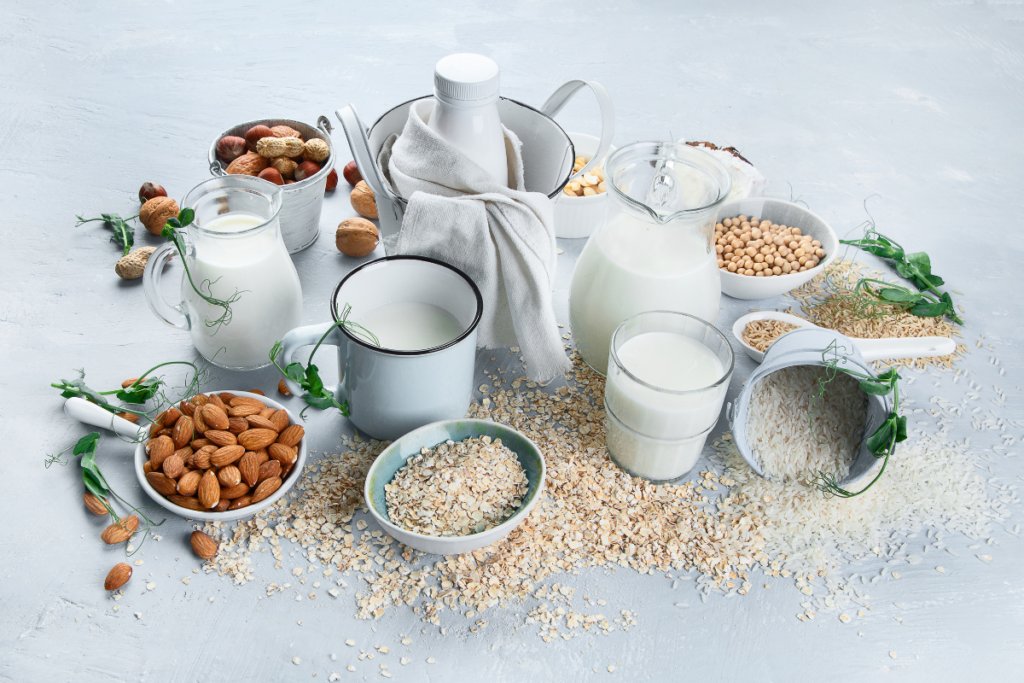
Processing
All plant-based milks are classified as ‘ultra-processed’ foods (according to the NOVA classification criteria) as they rely on added ingredients to enhance the sensory elements / improve shelf life as well as fortification with micronutrients. However, classifying foods should be done by considering their nutritional profile, not just purely by the degree of processing or ingredients.
Here are my top tips for choosing a plant-based milk alternative:
- Opt for brands fortified with calcium, B12 and iodine as a minimum.
- If tolerated, choose soya or pea drinks for the closest nutritional profile to milk.
- Avoid organic milk alternatives as these are not fortified with micronutrients.
- Stick with unsweetened / no sugar versions to reduce added sugar intake.

Other points to consider if offering plant-based milk alternatives to children:
- Children under 12 months are not recommended to consume plant-based milk alternatives as their main drink source, but unsweetened fortified versions can be included as part of a healthy balanced diet from age 1. If you suspect your child has an allergy or they follow a dairy-free diet for other reasons, please speak to your GP who can refer you to a dietitian.
- Rice milk is not recommended to children under the age of 5 due to the arsenic content.
- Choose unsweetened / no sugar versions to minimise free sugar intake. Oat and rice drinks can be high in free sugars, whether sugar has been added or not (when the drink is processed, some of the starch is broken down into free sugars). This is important to consider if giving to a young child as they tend to consume a greater volume of milk than older children or adults. Some manufacturers are now modifying their production processes and there are ‘zero sugars’ varieties available.
Summary
There is scientific consensus that prioritising plants in the diet can lead to better outcomes for the health of people and the planet, however, as with animal-based diets, plant-based diets need to be well planned to meet dietary needs.
There is no guidance to remove dairy from diets, but for those with specific dietary preferences or allergies/intolerances which means that you do not eat dairy (or meat-based products), it’s important to consider the nutrients you might be lacking in your diet and how to replace these.
Opting for plant-based drinks that are fortified with calcium, vitamin B12, iodine, and vitamin D can reduce the risk of deficiencies. For vulnerable groups who may be more reliant on dairy as a protein source (e.g., under 1 year olds) it is also important to consider drinks that are similar in protein content such as those based on soya and pea.
Any questions? Please let me know in the comment box below.
Please note, data on products are sourced from Ocado, Tesco, Sainsbury’s and ASDA and are correct as of July 2023.
References
British Dietetic Association One Blue Dot Resources. https://www.bda.uk.com/resource/one-blue-dot.html
Mintel (2023). Emerging Trends in the Plant-Based Industry. https://www.mintel.com/food-and-drink-market-news/emerging-plant-based-trends/
The Sixth Carbon Budget: The UK’s Path to Net Zero. December 2020. https://www.theccc.org.uk/wp-content/uploads/2020/12/The-Sixth-Carbon-Budget-The-UKs-path-to-Net-Zero.pdf
Product nutrition information sourced from Tesco, Asda, Sainsbury’s, Waitrose, and Ocado (July 2023).
Guide to creating a front of pack (FOP) nutrition label for pre-packed products sold through retail outlets. https://www.food.gov.uk/sites/default/files/media/document/fop-guidance_0.pdf
First Steps Nutrition Trust: Plant-based milk alternatives in the diets of 1–4 year-olds. https://static1.squarespace.com/static/59f75004f09ca48694070f3b/t/609250486fead72b89e9de8d/1620201544784/Plant+based+milk+alternatives+in+the+diets+of+1-4+year+olds_April2021a.pdf
Food and Agriculture Organization of the United Nations (2019) Ultra-processed foods, diet quality, and health using the NOVA classification system. https://www.fao.org/3/ca5644en/ca5644en.pdf
British Nutrition Foundation Position Statement on Ultra Processed Foods. https://www.nutrition.org.uk/media/swdophda/upf-position-statement-april-2023.pdf
